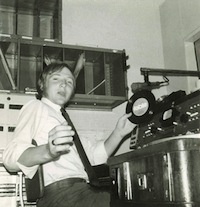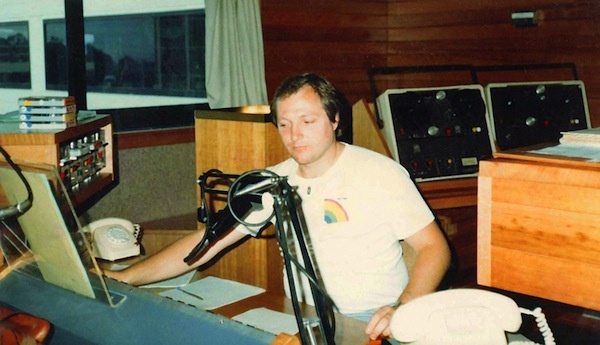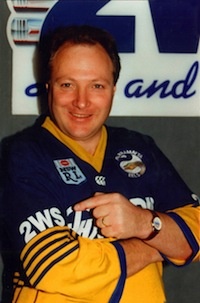Peter Saxon discusses a life in radio with the 2012 Hall of Fame inductee. Graham Mott has radio in his veins. He climbed to the top of the industry, old school, by starting at the bottom. He was just 17 when the legendary Barry Augustus gave him his first job as a panel operator at 2GB, in 1969.
While he has learnt many skills along the way it is his gut instinct for broadcasting that has set him apart as a programmer and as a general manager. Chief among his attributes is what he describes as, “A very good bullshit detector. People in radio can bullshit pretty well when they need to, or when they want to. But my focus at all times has been getting the job done with no bullshit.”
Of his 43 years in this business, we’ve been friends for 33 of them. We worked together at Wesgo and played golf at Emu Plains while whingeing about the way that WS was run. After I had a triple bypass in 1997, he got on a plane just to see how I was. Once he realised he’d be waiting around a long, long time for the funeral, he flew back. I returned the favour after he was diagnosed with cancer a few years ago. We’re both still here to tell the tale – even if our stories differ.
There were times, of course, when the friendship was strained. A few times over the years he chastised radioinfo about getting our facts wrong. And a few times he was right. But last year at the height of the Michael Smith affair, he called radioinfo a “rubbish publication” after we’d posted the headline “Media Watch takes scalp at 2UE,” inferring that it was due to a report in that show that forced 2UE to capitulate by taking Smith off air.
“That wasn’t the reason!!” Mott barked down the phone at me “Why don’t you ring me before you print such bullshit?” True, we hadn’t talked to Mott before we published it. But we had spoken to 2UE’s GM at the time, Tim McDermott.
Although I took exception at the time and considered ending our relationship, I cut my old friend some slack and put it down to the pressure he was under, battling both cancer and an indifferent Fairfax board, while he duchessed prospective buyers around the network. Besides, life is too short to let bullshit like that ruin a friendship. In any case, he soon apologised for the “rubbish” remark and we’ve never spoken of it since. In a few months, he’s flying up from Melbourne, at his own expense at the blunt end of the plane, to help celebrate my 60th. You gotta love this guy!
Of course, I’m not the only one who has felt the lash of Mott’s acid tongue. Those who’ve been on the receiving end are legion. But Mott knows himself only too well, “I must say with regret, sometimes my bedside manner wasn’t all that good. And I think I learned over the years that that needed to improve.”
It can, indeed, be lonely at the top. And at times, Graham Mott has been lonelier than most. Whatever else anybody thinks of him, everybody I know respects him. Respect is the highest accolade you can earn in this business. Which is why he is such a popular choice for this year’s Hall of Fame.
In this first part of the chat we had after his induction, Mott talks about his time at 2UW and it’s epic fail as Magic 11. How he got the better John Singleton at 2KY and his social climbing boss at 2WS.
Most people start their radio career in the country and work their way to the city. Mott did it the other way around.
 From his start as a panel operator at 2GB the young Mott soon became a program producer as well as a commercial producer. He went to 2SM for six months to operate their, then, state-of–the-art automation system before 2GB lured him back as Operations Manager.
From his start as a panel operator at 2GB the young Mott soon became a program producer as well as a commercial producer. He went to 2SM for six months to operate their, then, state-of–the-art automation system before 2GB lured him back as Operations Manager.
It took 10 years, but Mott finally left Sydney in 1979 to take up his first announcing job at 2NM in Muswellbrook. “I had two of the best years of my life on the air and producing all their commercials. I worked with some really good people there and had an absolute ball,” recalls Mott.
Then it was back to Sydney to take up an offer to do mid-dawns and weekends on 2UW (now Mix 106.5). Taking multi-tasking to its limits, Mott did live crosses from promotions, schmoozed clients at sales promotions and filled in for the commercial producer when he went on holidays.
He spent four mostly happy years at 2UW although Mott concedes, “The last year, when it became Magic 11, was a disaster. I used to produce The Magic Morning Zoo with Glenn Shorrock and Ron E. Sparks (who was also the PD) doing breakfast. That was an experience,” he says wryly.
But the ‘experience’ taught him a valuable lesson, “2UW thought the name 2UW was dead and that they should rebrand themselves. One of the funny things was, we were running a 3 minute and 40 second promotion on how the new station would not interrupt the music! I said to Ron E. Sparks; ‘Ron we are running a bloody 3 min and 40 second promo on how we are not going to interrupt the music and we are spending 3 minutes and 40 seconds interrupting the music!’
So, I learnt you don’t push change because you want change – it has got to be the audience that can accept that change and needs that change, not the station. I’ve always been a champion of what the audience thinks.”

Armed with that lesson and 14 years of accumulated broadcasting wisdom, Mott took on the Program Manager’s role at 2KY, which at the time, was owned by the Labor Council of NSW. It broadcast a peculiar programming mix of racing, country music and talk, headed by Ron Casey in breakfast and, in mornings, John Singleton, who is now the major shareholder in MRN, owner of 2GB and 2CH.
When Mott arrived at the station, the first thing he wanted to do was get the country music off air. “I thought; when we talk, lets just talk. We don’t need to play music. If they want, they can play music between the races in the afternoons. So I said to Ron Casey and Singleton, ‘you guys are really good at what you do. The audience want to hear you. They don’t want to hear songs.”
But as a fresh faced first time PD, it wasn’t easy to convince a heavyweight like Singo, of the need to change format. So Mott devised a plan.
“Singleton was married at the time to Belinda Green. I got on side with Belinda and I convinced her that people wanted to listen to Singo and that the country music didn’t need to be there. And she helped convince him that I was right.”
Having achieved a very respectable eight share with the station, Mott left citing political interference, which he says, probably had a lot to do with Singo chucking it in too.
He lobbed up at Wesgo, which owned 2WS as the flagship of a growing network of stations. He was to work with Mike Wass at Westat as a program consultant to look after the group. Soon he was transferred to 2WS as PD.
“The station wasn’t performing as well as it should’ve been. And after a couple of days, I could see what the problem was. The General Manager wanted to take the station upmarket.
 “I said to him, ‘you’ve got to be kidding!’ That’s not what this station is all about. This is not what the audience expects.
“I said to him, ‘you’ve got to be kidding!’ That’s not what this station is all about. This is not what the audience expects.
“I was even told to do things like; ‘don’t put the local advertisers’ commercials first. Bury them in the middle of the break. Start with the national advertisers.’
“What I worked out about the GM was that he was a snob. He wanted 2WS to be what suited him, not what the audience wanted it to be – which was all about Sydney’s Greater West.
“So in the end I told him to shove his job and I left without a job to go to. And that was when I was called up by Bruce Rogerson who was head of the then AWA network and I ended up being appointed the program director of 3MP in Melbourne.”
What followed was another steep learning curve for Mott. “It was the first time I programmed easy listening and it was the first time I’d lived in Melbourne.
I moved the station from elevator music and orchestral stuff and changed it to easy music and the station became a success.”
As is the often the mysterious way in which radio works, within three months of Mott joining 3MP, it was bought by Wesgo whose CEO at the time, Bob Scott, wanted him to come back to Sydney.
“I remember Scotty came to Melbourne and he took me for a drive in his car. All the while we were driving around, he kept asking, ‘what are we going to do about 2WS?’ I said, Bob, ‘I don’t give a fuck about 2WS. I program 3MP.
I’d told them before what they had to do and what would happen if they didn’t. I was quite belligerent about it. And I guess I wanted to punish them a bit because they didn’t listen to me.”
As they say, what goes around comes around. Or the other way around. And the trick Mott had played on Singo was about to be played on him.
“Eventually they did the sneaky,” he recalls, “It was Tony Moltzen who rang my wife who wasn’t very happy about living in Frankston at the time.
“I came home one night and she said to me, you didn’t tell me that you had the chance to go back to Sydney.’ I said, ‘I don’t really want to go back. I think they still have a lot of problems.
“Then she told me how much they were prepared to pay me.
“And then Tony rang back and he said that John Eller is going to be the GM.
Then Eller rang me and said, ‘Mate don’t worry about it. I totally respect your ability. And if you can get this place back on the road we will both look like heroes.
John was all about sales, so I knew he’d leave me alone. So, I went back to Sydney in November 1988 and I was appointed GM in Dec 1989.”
By now Mott had become an established programmer in the Australian radio industry, yet, he was still learning.
“In those days, I used to speak with John Williams who was managing 2WS’ arch rival, 2UW. John and I share the same birthday – we were both born on the 27th of February, 1952 – so we would always joke about our birthday.
“Anyway, I said to John, ‘There is one thing I’ve learnt in life, John, and that is: Success Buys You Freedom. Get the results and they will leave you alone. I still say that to this very day. Success buys you freedom.
“Fortunately for me, we turned 2WS around. We put a campaign on the air about Sydney Moving West: The Greater West, 2WS. We got our western Sydney audience back in droves which gave us a very good share and we had a massive market to ourselves.”
Watch out tomorrow for Part Two of the Graham Mott story as he moves to 3AW. The Southern Cross years and the Fairfax years. Read how he thought that Ray Hadley should have been retained by 2UE and how close 3AW came to losing Neil Mitchell to MTR 1377.

Peter Saxon


still waiting & watching out for part two ?